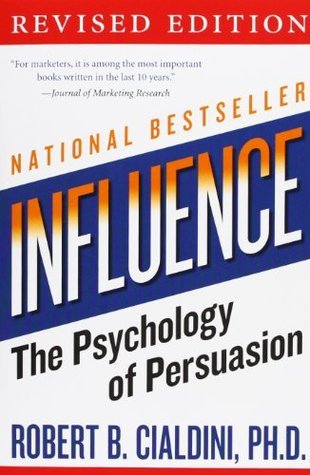
Influence: The Psychology of Persuasion
by Robert B. Cialdini
30 popular highlights from this book
Key Insights & Memorable Quotes
Below are the most popular and impactful highlights and quotes from Influence: The Psychology of Persuasion:(Showing 30 of 30)
A well-known principle of human behavior says that when we ask someone to do us a favor we will be more successful if we provide a reason. People simply like to have reasons for what they do.
Embarrassment is a villain to be crushed.
The way to love anything is to realize that it might be lost.
we all fool ourselves from time to time in order to keep our thoughts and beliefs consistent with what we have already done or decided
There is a natural human tendency to dislike a person who brings us unpleasant information, even when that person did not cause the bad news. The simple association with it is enough to stimulate our dislike.
persons who go through a great deal of trouble or pain to attain something tend to value it more highly than persons who attain the same thing with a minimum of effort.
people seem to be more motivated by the thought of losing something than by the thought of gaining something of equal value.
Often we don’t realize that our attitude toward something has been influenced by the number of times we have been exposed to it in the past.
Freedoms once granted will not be relinquished without a fight.
The truly gifted negotiator, then, is one whose initial position is exaggerated enough to allow for a series of concessions that will yield a desirable final offer from the opponent, yet is not so outlandish as to be seen as illegitimate from the start.
Everything should be made as simple as possible, but not simpler. —ALBERT EINSTEIN
Since 95 percent of the people are imitators and only 5 percent initiators, people are persuaded more by the actions of others than by any proof we can offer.
The idea of potential loss plays a large role in human decision making. In fact, people seem to be more motivated by the thought of losing something than by the thought of gaining something of equal value.
Excuse me, I have five pages. May I use the Xerox machine because I have to make some copies? The result was that once again nearly all (93 percent) agreed, even though no real reason, no new information, was added to justify their compliance. Just as the “cheep-cheep” sound of turkey chicks triggered an automatic mothering response from maternal turkeys—even when it emanated from a stuffed polecat—so, too, did the word “because” trigger an automatic compliance response
There is no expedient to which a man will not resort to avoid the real labor of thinking.
It is easier to resist at the beginning than at the end. —LEONARDO DA VINCI
All things being equal, you root for your own sex, your own culture, your own locality…and what you want to prove is that you are better than the other person. Whomever you root for represents you; and when he wins, you win.”88
Be as precise as possible about your need for aid.
Research has shown that we automatically assign to good-looking individuals such favorable traits as talent, kindness, honesty, and intelligence (for a review of this evidence, see Langlois et al., 2000).
First, we seem to assume that if a lot of people are doing the same thing, they must know something we don’t.
In general, when we are unsure of ourselves, when the situation is unclear or ambiguous, when uncertainty reigns, we are most likely to look to and accept the actions of others as correct.
When our freedom to have something is limited, the item becomes less available, and we experience an increased desire for it. However, we rarely recognize that psychological reactance has caused us to want the item more; all we know is that we want it. Still, we need to make sense of our desire for the item, so we begin to assign it positive qualities to justify the desire.
Our best evidence of what people truly feel and believe comes less from their words than from their deeds.
Apparently we have such an automatically positive reaction to compliments that we can fall victim to someone who uses them in an obvious attempt to win our favor.
good-looking people are aware that other people’s positive evaluations of them are not based on their actual traits and abilities but are often caused by an attractiveness “halo
We like people who are similar to us. This fact seems to hold true whether the similarity is in the area of opinions, personality traits, background, or life-style.
our typical reaction to scarcity hinders our ability to think.
The customers, mostly well-to-do vacationers with little knowledge of turquoise, were using a standard principle—a stereotype—to guide their buying: “expensive = good.
The truly gifted negotiator, then, is one whose initial position is exaggerated enough to allow for a series of reciprocal concessions that will yield a desirable final offer from the opponent, yet is not so outlandish as to be seen as illegitimate from the start.
It is much more profitable for salespeople to present the expensive item first, not only because to fail to do so will lose the influence of the contrast principle; to fail to do so will also cause the principle to work actively against them. Presenting an inexpensive product first and following it with an expensive one will cause the expensive item to seem even more costly as a result—hardly a desirable consequence for most sales organizations.


